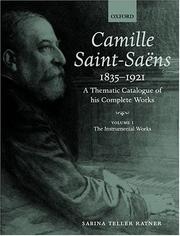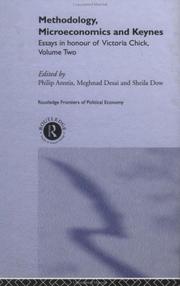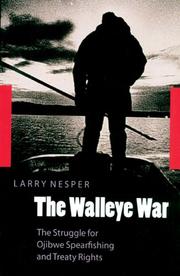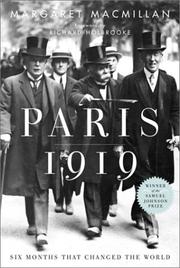| Listing 1 - 5 of 5 |
Sort by
|

ISBN: 0198163207 9780198163213 Year: 2002 Publisher: Oxford Oxford University Press
Abstract | Keywords | Export | Availability | Bookmark
 Loading...
Loading...Choose an application
- Reference Manager
- EndNote
- RefWorks (Direct export to RefWorks)
Saint-Saens, Camille --- Saint-Saëns, Camille, --- Saëns, Camille Saint-, --- Saint-Saëns, C. --- Saint-Saëns, Camille --- Saint-Saëns, Charles Camille, --- Saint Saenz, --- Sans, Kamilʹ Sen-, --- Sen-Sans, K. --- Sen-Sans, Kamilʹ, --- Sen-Sansas, K., --- St. Saëns, --- סן־ססנס, קמיל --- סן־ססנס, קמיל, --- Saint-Saëns, Camille --- Thematic catalogs --- Sen-Sans, Kamiĭ, --- Sans, Kamiĭ Sen-, --- Сен-Санс, Камиль, --- Thematische catalogi --- 19e eeuw --- 20e eeuw --- Frankrijk

ISBN: 8437619904 9788437619903 Year: 2002 Volume: 531 Publisher: Madrid: Cátedra,
Abstract | Keywords | Export | Availability | Bookmark
 Loading...
Loading...Choose an application
- Reference Manager
- EndNote
- RefWorks (Direct export to RefWorks)

ISBN: 0415232198 0415758335 0203467485 1134572999 1280403896 0203246403 0429232594 1134572980 041523218X 9780415232197 9780415232180 Year: 2002 Publisher: London ; New York : Routledge,
Abstract | Keywords | Export | Availability | Bookmark
 Loading...
Loading...Choose an application
- Reference Manager
- EndNote
- RefWorks (Direct export to RefWorks)
This volume, a companion to Money, Macroeconomics and Keynes, represents both consolidation and the breaking of new ground in Keynesian methodology and microeconomics by leading figures in these fields.
AA / International- internationaal --- 330.47 --- Keynes en zijn school. --- Chick, Victoria. --- Keynesian economics. --- Macroeconomics. --- Microeconomics. --- Monetary policy. --- Keynesian economics --- Monetary policy --- Macroeconomics --- Microeconomics --- Business & Economics --- Economic Theory --- Chick, Victoria --- Keynes, John Maynard, --- Price theory --- Monetary management --- Post-Keynesian economics --- Keĭns, Dzhon Maĭnard, --- Kʻai-yin-ssŭ, --- Kʻai-en-ssu, --- Keynes, J. M. --- Kenis, C. M., --- Keyns, C. M., --- Economics --- Economic policy --- Currency boards --- Money supply --- Schools of economics --- Keynes en zijn school --- Keynes, J. Maynard --- Keynes, J.M. --- Chick, Victoria - Biography --- Chick, Victoria - Bibliography --- Keynes, John Maynard, - 1883-1946

ISBN: 1280374136 9786610374137 0803202296 9780803202290 9781280374135 6610374139 0803233442 9780803233447 0803283806 9780803283800 Year: 2002 Publisher: Lincoln University of Nebraska Press
Abstract | Keywords | Export | Availability | Bookmark
 Loading...
Loading...Choose an application
- Reference Manager
- EndNote
- RefWorks (Direct export to RefWorks)
"For generations, the Ojibwe bands of northern Wisconsin have spearfished spawning walleyed pike in the springtime. The bands reserved hunting, fishing, and gathering rights on the lands that would become the northern third of Wisconsin in treaties signed with the federal government in 1837, 1842, and 1854. Those rights, however, would be ignored by the state of Wisconsin for more than a century. When a federal appeals court in 1983 upheld the bands' off-reservation rights, a deep and far-reaching conflict erupted between the Ojibwe bands and some of their non-Native neighbors. Starting in the mid-1980s, protesters and supporters flocked to the boat landings of lakes being spearfished; Ojibwe spearfisher-men were threatened, stoned, and shot at. Peace and protest rallies, marches, and ceremonies galvanized and rocked the local communities and reservations, and individuals and organizations from across the country poured into northern Wisconsin to take sides in the spearfishing dispute. From the front lines on lakes to tense, behind-the-scenes maneuvering on and off reservations, The Walleye War tells the riveting story of the spearfishing conflict, drawing on the experiences and perspectives of the members of the Lac du Flambeau reservation and an anthropologist who accompanied them on spearfishing expeditions. We learn of the historical roots and cultural significance of spearfishing and off-reservation treaty rights and we see why many modern Ojibwes and non-Natives view them in profoundly different ways. We also come to understand why the Flambeau tribal council and some tribal members disagreed with the spearfishermen and pursued a policy of negotiation with the state to lease the off-reservation treaty rights for fifty million dollars. Fought with rocks and metaphors, The Walleye War is the story of a Native people's struggle for dignity, identity, and self-preservation in the modern world."--pub. desc.
Ojibwa Indians --- Algic Indians --- Anishinabe Indians --- Bawichtigoutek Indians --- Bungee Indians --- Bungi Indians --- Chipouais Indians --- Chippewa Indians --- Lac Courte Oreilles Indians --- Ochepwa Indians --- Odjibway Indians --- Ojebwa Indians --- Ojibua Indians --- Ojibwauk Indians --- Ojibway Indians --- Ojibwe Indians --- Otchilpwe Indians --- Otchipwe Indians --- Salteaux Indians --- Saulteaux Indians --- Algonquian Indians --- Indians of North America --- Legal status, laws, etc. --- Fishing --- Wisconsin --- Lac du Flambeau Reservation (Wis.) --- Lac de Flambeau Indian Reservation (Wis.) --- Lac de Flambeau Reserve (Wis.) --- Lac du Flambeau Indian Reservation (Wis.) --- Beʼekʼidtaʼ Hahoodzo --- Oyiskonsin --- Shtat Viskonsyn --- Steat Wiskonsin --- Uiskonsin --- Uisqonsin --- Uisukonshin --- Uisukonshin-shū --- US-WI --- Visconsinia --- Viskonsėns --- Viskonsin --- Viskonsina --- Viskonsinas --- Viskonsino --- Viskonsyn --- Weisikangxin --- Weisikangxin Zhou --- WI --- Wikonekina --- Wis. --- Wisc. --- Wisconsene --- Wisconsin suyu --- Wisconzin --- Wiskonnsenn --- Wiskonsan --- Wiskonsiin --- Wiskonsin --- Wiskonsin Shitati --- Ουισκόνσιν --- Уисконсин --- Штат Вісконсин --- Висконсин --- Вісконсин --- Вісконсін --- וויסקאנסין --- ויסקונסין --- ウィスコンシン --- ウィスコンシン州 --- 威斯康辛 --- 威斯康辛州 --- Wisconsin Territory --- Ethnic relations.

ISBN: 0375508260 9780375508264 9780375760525 0375760520 Year: 2002 Publisher: New York Random House
Abstract | Keywords | Export | Availability | Bookmark
 Loading...
Loading...Choose an application
- Reference Manager
- EndNote
- RefWorks (Direct export to RefWorks)
"Between January and July 1919, after "the war to end all wars," men and women from around the world converged on Paris to shape the peace. Center stage, for the first time in history, was an American president, Woodrow Wilson, who with his Fourteen Points seemed to promise to so many people the fulfillment of their dreams. Stern, intransigent, impatient when it came to security concerns and wildly idealistic in his dream of a League of Nations that would resolve all future conflict peacefully, Wilson is only one of the larger-than-life characters who fill the pages of this extraordinary book. David Lloyd George, the gregarious and wily British prime minister, brought Winston Churchill and John Maynard Keynes. Lawrence of Arabia joined the Arab delegation. Ho Chi Minh, a kitchen assistant at the Ritz, submitted a petition for an independent Vietnam. For six months, Paris was effectively the center of the world as the peacemakers carved up bankrupt empires and created new countries. This book brings to life the personalities, ideals, and prejudices of the men who shaped the settlement. They pushed Russia to the sidelines, alienated China, and dismissed the Arabs. They struggled with the problems of Kosovo, of the Kurds, and of a homeland for the Jews. The peacemakers, so it has been said, failed dismally; above all they failed to prevent another war. Margaret MacMillan argues that they have unfairly been made the scapegoats for the mistakes of those who came later. She refutes received ideas about the path from Versailles to World War II and debunks the widely accepted notion that reparations imposed on the Germans were in large part responsible for the Second World War"--Dust jacket flap.
World War, 1914-1918 --- Peace. --- Peace --- Territorial questions --- Wilson, Woodrow, --- Wei-erh-hsün, --- Vilʹson, Vudro, --- Wilson, Thomas Woodrow, --- Wilson, T. W. --- Wiruson, Wuddorō, --- Wilson, Tommy, --- 威爾遜, --- Paris Peace Conference --- Conférence de la paix --- Paris Peace Conference (1919-1920) --- Conférence de la paix --- Conferenza di pace di Parigi --- Friedenskonferenz --- Konferencja Pokojowa w Paryżu --- Pa-li ho hui --- Paris. --- Pariser Friedenskonferenz --- Parisiin Rauhankonferenssia --- Parizhskai︠a︡ mirnai︠a︡ konferent︠s︡ii︠a︡ --- Peace Conference at Paris --- Preliminary Peace Conference --- Versailles Peace Conference --- Peace Commission --- Kunfirāns-i Ṣulḥ-i Pārīs --- کنفرانس صلح پاريس --- Conferința de Pace de la Paris-Versailles --- Parīzes Miera konference --- Treaty of Versailles --- Conditions de paix --- Conditions of Peace --- Fan-erh-sai ho yüeh --- Traktat Wersalski --- Versailler Vertrag --- Versailles Treaty --- Vertrag von Versailles --- Traité de Versailles --- Germany --- Weimar Republic, Germany, 1918-1933 --- History --- Boundaries. --- Traité de Versailles (1919) --- Versaĭski dogovor
| Listing 1 - 5 of 5 |
Sort by
|

 Search
Search Feedback
Feedback About UniCat
About UniCat  Help
Help News
News